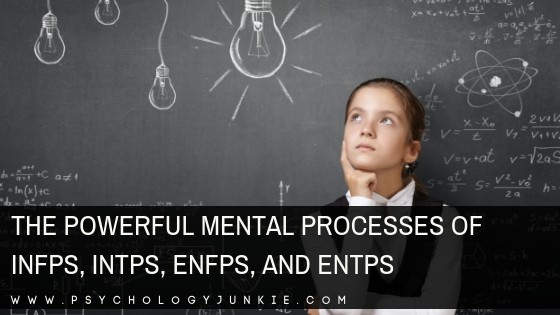The Powerful Mental Processes of INFPs, INTPs, ENFPs and ENTPs
Today we’re going to take a close look at the four personality types characterized by their use of Extraverted Intuition (Ne). These personality types are known for their innovative ideas, big picture vision, and ability to see connections between random events in the universe. Next week we will discuss the Intuitive Judging personality types (INFJs, INTJs, ENFJs, and ENTJs).
Not sure what your personality type is?
Take the most accurate free online assessment here.

This article contains affiliate links. I only recommend products I truly believe in.
Estimated reading time: 11 minutes
The ENFP

Dominant Function: Extraverted Intuition (Ne)
ENFPs envision options, possibilities, and potential on a near-constant basis. They are focused on the big picture, exploring abstractions and concepts, and seeing creative connections. They quickly get the gist of anything that interests them, seeing the connections and the “general idea” behind things. They are intensely imaginative and more focused on what “could be” than what currently exists.
Auxiliary Function: Introverted Feeling (Fi)
ENFPs often have personal motives for their intuitive plans. They are receptive to the feelings of others and live to inspire and motivate people. They believe in making honorable choices, staying true to their values, and improving institutions and situations for people. They may have to experiment for a while and test different beliefs to figure out where they really stand. Rather than generating their values based on the beliefs of their “tribe” they have to be sure they are staying true to what feels right on a gut, individual level.
Tertiary Function: Extraverted Thinking (Te)
When ENFPs have a goal or direction they want to take, they can be very good at creating a sequence or plan for achieving that goal. They may struggle with this in early life, but as they reach their 20’s and beyond they tend to be more adept at logically prioritizing. At the same time, they hate to feel controlled by anyone else and they hate having their intuitions and plans criticized. They can become defensive if criticized about their priorities or the reality of their vision.
Inferior Function: Introverted Sensing (Si)
As the inferior function, Si is often repressed in favor of Ne visions and ideas. ENFPs value freedom of thought and inspiration and enjoy chasing after endless possibilities. They can repress Si’s need for comfort, caution, physical security, and stability in their effort to chase after their dreams. Over time this can cause ENFPs to have a “Si-uprising” and develop “grip” stress. When this happens, they develop “tunnel vision” and feel as if they’ve lost their creative spark. They tend to feel alone, isolated, and misunderstood. They may fear that the past is going to come back to haunt them or that there is no way out of the current situation. They can become nitpicky about details or worried about physical symptoms. They may sleep, eat, or tend to their physical needs obsessively.
With time and development, Si can become an asset to the ENFP. When they explore new ideas they can look at the practical realities in tandem with the big picture. They pause before venturing out on a new project to make sure they are taking care of their physical needs. They develop a healthy respect for past experience and traditions. They become less impulsive and scattered.
Read This Next: 10 Things You’ll Relate to if You’re an ENFP
The ENTP

Dominant Function: Extraverted Intuition (Ne)
ENTPs are driven by a ceaseless need to explore new ideas, possibilities, and innovations. They want to make everything better, and they get an intense satisfaction from flipping tradition on its head so that they can see new alternatives. They quickly see connections between seemingly unrelated events and rapidly get the “gist” of a situation. They are driven by the pursuit of the possible rather than what currently exists. In fact, focusing on what already exists tends to bore or depress them.
Auxiliary Function: Introverted Thinking (Ti)
ENTPs use impersonal logic when they make decisions, weighing pros and cons and looking at what’s most accurate and true. They are good at strategically taking action in specific situations where there are a lot of variables and ever-changing circumstances. They enjoy collecting data and sifting through it to find out which data is “clean” and as accurate as possible. They enjoy creating and innovating systems and creating internal frameworks that explain how everything in the world is connected and works together logically.
Tertiary Function: Extraverted Feeling (Fe)
ENTPs tend to have a certain charm and skill at connecting with people and getting reactions from them. They know how to “read a room” or push the right buttons to get people interested in an idea. Healthy ENTPs enjoy helping others and creating harmony, while unhealthy ENTPs can enjoy toying with people just to get the reaction they want. This function usually doesn’t develop in a mature way until the ENTP is in their 20’s or older. As this function develops they tend to become more empathetic and conscious of the social expectations in any particular environment.
Inferior Function: Introverted Sensing (Si)
As the inferior function, Si is often repressed in favor of Ne visions and ideas. ENTPs value freedom of thought and inspiration and enjoy chasing after limitless possibilities. They can repress Si’s need for comfort, caution, physical security, and stability in their effort to chase after their ideas. Over time this can cause ENTPs to experience a “Si-uprising” and develop grip stress. When this happens, they develop “tunnel vision” and feel as if they’ve lost their creative spark. They struggle to see possibilities, get overwhelmed when brainstorming, and see no path forward. They feel “stuck” and become irritable, focused on details and past mistakes. They may feel sick and develop an irrational fear that they are dealing with a life-threatening illness. They feel crushed under the weight of all the tasks that they aren’t completing.
With time and development, Si can become an asset to the ENTP. When they explore new ideas they can look at the practical realities in tandem with the big picture. They pause before venturing out on a new project to make sure they are taking care of their physical needs. They develop a healthy respect for past experience and traditions. They become less impulsive and scattered.
Read This Next: 10 Surprising Truths About ENTPs
The INFP

Dominant Function: Introverted Feeling (Fi)
INFPs are on a constant quest for personal growth and meaning. They are constantly shaping their inner value system, sometimes without realizing it, to discern what they believe. They are always re-defining what’s important to them and what’s “right” on a basic human level. The value system of the INFP is extremely individual and unique. They don’t look to rules and social norms to define what’s right and wrong, their values come from a gut level. Thus, INFPs are very individualistic and skeptical of rules and structures. They are also gifted with a strong sense of empathy. They easily put themselves in other people’s shoes and imagine how they are feeling. This makes them very good at helping in an emotional crisis.
Auxiliary Function: Extraverted Intuition (Ne)
INFPs are imaginative and visionary, and they enjoy channeling their values into creative inventions. They easily see how things can be changed or re-invented and made better and tend to pursue life-paths that will make things better for the “underdogs” of the world. They enjoy brainstorming and are skilled at seeing the underlying patterns that connect all things. They want to understand the existential context of what they are experiencing and they find great joy in pursuing their dreams and visions of the future.
Tertiary Function: Introverted Sensing (Si)
Healthy INFPs balance their imaginative outlook on life with a firm sense of what’s real, what their experience has taught them, and what will provide inner stability. Healthy development of Si gives INFPs a respect for positive traditions, a fondness for re-living favorite memories, and a desire for health and inner well-being. However, since this function is lower on their function stack than Fi and Ne, INFPs can sometimes use it in a warped way. They can dwell on past experiences in order to justify current feelings or bad judgments or they can fail to make progress because they’re afraid to get out of their comfort zone. This function usually develops more fully in the 20’s and beyond.
Inferior Function: Extraverted Thinking (Te)
As the inferior function, Te is often repressed in favor of Fi objectives. INFPs would much rather focus on their values, ideals, and an unstructured, free-spirited approach to life. They can repress Te’s need for a clear plan, structure, and an impersonal, logical solution. If INFPs repress Te for too long they can experience a “Te-uprising” during times of extreme stress. This can cause them to behave uncharacteristically and against-type. Normally flexible and empathetic, they can start to feel empty, hardened, and unable to express themselves. They tend to correct other people, become abnormally critical, and feel disappointed in everything and everyone around them. They feel incapable of overcoming their negativity and can struggle to see their own strengths and positive qualities.
When INFPs allow Te to have a small voice inside their mind instead of suppressing it they can develop it in healthy ways. This allows them to become more structured, organized, and more efficient at achieving the goals they set out for themselves.
Read This Next: 10 Things You’ll Relate to if You’re an INFP
The INTP

Dominant Function: Introverted Thinking (Ti)
INTPs enjoy understanding the basic framework for how everything works and is put together. They are constantly refining the data they take in and piecing it together with all the other data they have in their mind, figuring out which data is accurate and which is not. They construct very precise mental models so that they can predict outcomes and calculate probabilities. They are very in tune with cause and effect and are aware of what information is useful or irrelevant. They are usually good at systems analysis and they are typically rational and objective.
Auxiliary Function: Extraverted Intuition (Ne)
INTPs are imaginative and visionary, and they enjoy channeling their ideas into creative inventions. They easily see how things can be changed or re-imagined. They enjoy theoretical reasoning and finding possibilities for structures or logical models. They enjoy brainstorming, working with variables, and strategizing about future potentialities. They want to understand the existential context of what they are creating now and they find great joy in experimenting, de-coding, and asking “What if?” questions.
Tertiary Function: Introverted Sensing (Si)
Healthy INTPs balance their innovative outlook on life with a firm sense of what’s real, what their experience has taught them, and what will provide inner stability. Healthy development of Si gives INTPs a respect for positive traditions, a fondness for re-living favorite memories, and a desire for health and inner well-being. However, since this function is lower on their function stack than Ti and Ne, INTPs can sometimes use it in an inconsistent, warped way or suppress it entirely. They can sometimes struggle with dwelling on past experiences in order to justify bad judgments or they can fail to make progress because they’re afraid to get out of their comfort zone. This function usually develops more fully in their 20’s and beyond.
Inferior Function: Extraverted Feeling (Fe)
Inferior Fe development gives INTPs an awareness of social constructs, expectations, and rules. They are able to create social support systems for themselves and pick up on the feelings and expectations of others. Since this is the INTPs inferior function, they tend to suppress it in favor of Ti or they may struggle to value its input. This can make INTPs antagonistic towards people who try to impose a social standard on them. It can also cause them to struggle with empathy and understanding other people’s perspectives. INTPs who severely repress Fe can have misanthropic tendencies.
If INTPs repress Fe for too long, or they are dealing with chronic or extreme stress, they may experience a “Fe-uprising”. When this happens they become uncharacteristically emotional, dramatic, or overwhelmed with feelings of awkwardness and loneliness. They can become fixated on getting affirmation, approval, or validation. During these stages they feel confused and frustrated with themselves, unable to understand why they’re acting so out of character. Their thinking will seem cloudy and they’ll struggle to make sense of their problems.
If INTPs work to respect Fe rather than suppress it then these high-stress episodes should be less frequent. Taking steps to reduce stress can also help.
Read This Next: 3 Weird and Wonderful Secrets About the INTP Personality Type
What Are Your Thoughts?
Did you enjoy this article? Do you have any thoughts or experiences you’d like to share with other readers? Let us know in the comments! Also be sure to follow me on Instagram or Facebook!











2 Comments